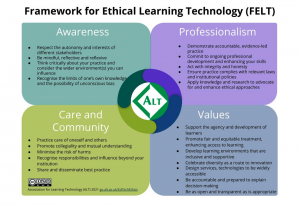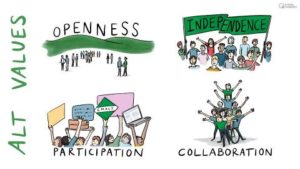Pedagogy
Artificial Intelligence and ethics
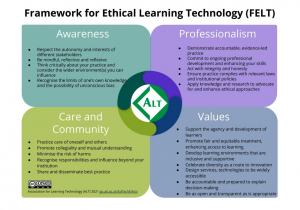 I have written before that despite the obvious ethical issues posed by Artificial Intelligence in general - and particular issues for education - I am not convinced by the various frameworks setting down rubrics for ethics, often voluntarily and often developed by professionals from within the AI industry. But I am encouraged by UK Association for Learning Technology's (ALT) Framework for Ethical Learning Technology, released at their annual conference last week. Importantly, it builds on ALT’s professional accreditation framework, CMALT, which has been expanded to include ethical considerations for professional practice and research.
I have written before that despite the obvious ethical issues posed by Artificial Intelligence in general - and particular issues for education - I am not convinced by the various frameworks setting down rubrics for ethics, often voluntarily and often developed by professionals from within the AI industry. But I am encouraged by UK Association for Learning Technology's (ALT) Framework for Ethical Learning Technology, released at their annual conference last week. Importantly, it builds on ALT’s professional accreditation framework, CMALT, which has been expanded to include ethical considerations for professional practice and research.
ALT say:
ALT’s Framework for Ethical Learning Technology (FELT) is designed to support individuals, organisations and industry in the ethical use of learning technology across sectors. It forms part of ALT’s strategic aim to strengthen recognition and representation for Learning Technology professionals from all sectors. The need for such a framework has become increasingly urgent as Learning Technology has been adopted on a larger scale than ever before and as the leading professional body for Learning Technology in the UK, representing 3,500 Members, ALT is well placed to lead this effort. We define Learning Technology as the broad range of communication, information and related technologies that are used to support learning, teaching and assessment. We recognise the wider context of Learning Technology policy, theory and history as fundamental to its ethical, equitable and fair use.
More details and resources are available on the ALT website.
The teleology of ed tech?
An ethical framework for Learning Technology
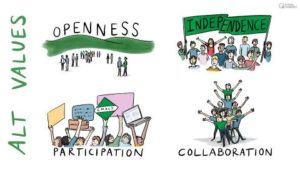 The Association for Learning Technologies in the UK (ALT) has the strategic aim of strengthening recognition and representation for Learning Technology professionals from all sectors. one of the priorities Members identified for this year is to develop an ethical framework for Learning Technology. They have developed a professional accreditation framework, CMALT, and last year extended it to include ethical considerations for professional practice and research last year.
The Association for Learning Technologies in the UK (ALT) has the strategic aim of strengthening recognition and representation for Learning Technology professionals from all sectors. one of the priorities Members identified for this year is to develop an ethical framework for Learning Technology. They have developed a professional accreditation framework, CMALT, and last year extended it to include ethical considerations for professional practice and research last year.
They are now developing a framework that can be used as a starting point for informing the ethical use of Learning Technology by professionals, institutions and industry and, they say, "have worked to define a set of ethical principles which will form the core of the new framework alongside tools including for example a checklist or reflective questionnaire, to help individuals, institutions and industry to see how these principles are put into action.:
They have now launched a Consultation, open until 5 June 2021, and are looking for feedback and input via a questionnaire to help finalise the framework ahead of the launch in September.
FutureLearn team up with Microsoft for online AI course
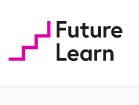 As many of you will know, FutureLearn is the UK Open Universities MOOC arm, run in conjunction with an international consortium of universities. But, I guess like everyone else, FutureLearn is under pressure to make some money. Their first go was offering paid for certificates for course completion. Another attempt has been to persuade people to sign up for an annual subscription, keeping courses open for a year if they pay.
As many of you will know, FutureLearn is the UK Open Universities MOOC arm, run in conjunction with an international consortium of universities. But, I guess like everyone else, FutureLearn is under pressure to make some money. Their first go was offering paid for certificates for course completion. Another attempt has been to persuade people to sign up for an annual subscription, keeping courses open for a year if they pay.
The latest is to partner with industries for courses providing micro accreditation, in some cases industry recognised. So in December Future Learning is launching “Artificial Intelligence on Microsoft Azure: Machine Learning and Python Basics‘, created by CloudSwft and inc conjunction with Microsoft. “On this microcredential”, they say ” you’ll address this challenge by developing key AI skills that can serve as the first steps towards becoming an AI engineer, business analyst, or AI professional.” And, “Yes. If you successfully complete this microcredential, you’ll receive a voucher to sit a separate exam to earn the Microsoft Azure AI Fundamentals (AI-900) and Microsoft Azure AI Engineer Associate (AI-100) certification.”
Why would FutureLearn be giving away vouchers for sitting Microsoft exams. It could be because the 15 week course costs 584 Euros to enroll. Much as I like microcredentially, this seems a long way from FutureLearn’s past MOOCs free for participation. And if as the course information claims, “artificial intelligence skills are frequently listed among the most in-demand workplace skills in the current and future job market, as organisations seek to harness AI to revolutionise their operations” and “employers are faced with a shortfall of qualified candidates” surely this is an area where public education and trainings services should be providing online course, rather than restricting access to those who can afford to pay for learning new skills.


